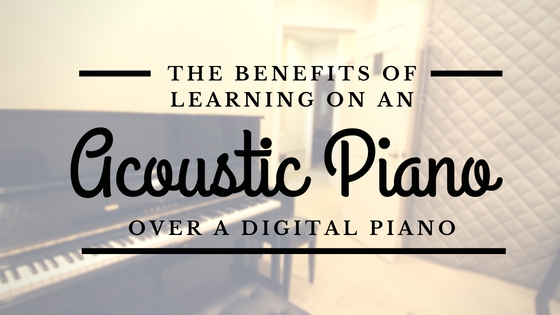While an electric keyboard or a digital piano is a great practical substitute when an acoustic piano is not available, such as for your home practice between lessons, there are still various features and learning benefits to traditional instruments that can’t be easily met by their digital counterparts. Considering upgrading your home instrument? We recommend considering a digital piano or, even better, an acoustic one. Take a look at some of the fundamental differences between digital and acoustic pianos:
Sound
First, and most importantly, students have to consider the sound of an instrument. While many technological strides have been made, it’s still no secret that keyboards and digital pianos are only created to imitate the exact sound production of a traditional one. It is true that manual tuning isn’t necessary for digital pianos to keep its pitch accurate, but the true sound of a well maintained acoustic piano has an unmistakable timbre and resonance that can’t be replicated. Students who play an acoustic instrument are likely to be inspired by the rich, full sound! And, as we know, an inspired student is more likely to work hard and play from the heart.
Touch Response
The force of how a student touches a piano key determines the intensity or the loudness of its response to every pressed key. There are digital instruments that attempt to replicate this effect, but there are also many more that do not. (When purchasing an instrument for home practice, a digital piano with “Fully-Weighted Keys” is strongly recommended!)
Touch response in different piano models also varies, so playing a song on different digital pianos might result in unexpected effects even when the piece is played in exactly the same way. This can make it difficult for students to adapt to the different digital models offered. With acoustic pianos, touch response is a natural element and pieces can be readily played the way they were meant to be. For this reason, all piano lessons with Cardon Studios are offered on our acoustic piano.
Feel
An inauthentic feel can drastically affect a student’s ability to perform. Many low-quality digital pianos have a lightweight plastic feel that makes a distinct clunky sound, making it frustrating to work with. These models resemble keyboards more than actual pianos, and if at all possible given your budget and available space, should not be used as a comparable substitute for an acoustic instrument. With a traditional piano, textured keys prevent slipping, and the keys have a normal weight that pianists quickly adapt to.
An acoustic piano provides the “original piano experience” in the way all players, regardless of skill level, are meant to perform, learn and improve. With its authentic touch and sound, traditional pianos make it a treat for students to learn on.
Eager to learn on an acoustic piano and boost your musical abilities? Begin piano lessons at Cardon Studios and learn from our expert instructors on our acoustic piano.

